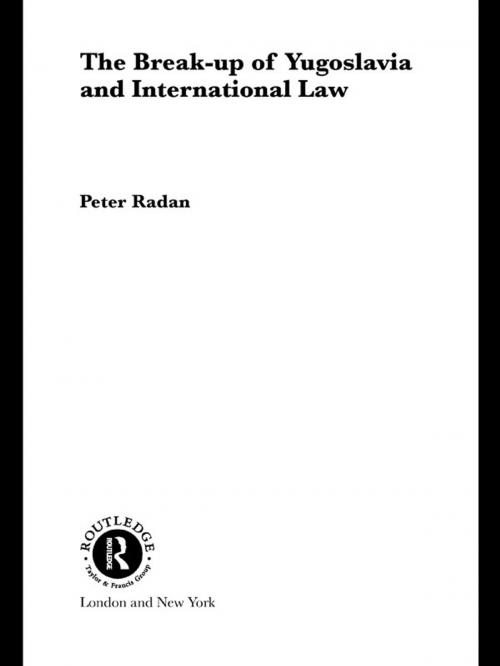The Break-up of Yugoslavia and International Law
Nonfiction, Social & Cultural Studies, Social Science, Sociology, Political Science| Author: | Peter Radan | ISBN: | 9781134525454 |
| Publisher: | Taylor and Francis | Publication: | January 14, 2004 |
| Imprint: | Routledge | Language: | English |
| Author: | Peter Radan |
| ISBN: | 9781134525454 |
| Publisher: | Taylor and Francis |
| Publication: | January 14, 2004 |
| Imprint: | Routledge |
| Language: | English |
The demise of the former Yugoslavia was brought about by various secessionist movements seeking international recognition of statehood. This book provides a critical analysis from an international law perspective of the break-up of Yugoslavia.
Although international recognition was granted to the former Yugoslav republics of Slovenia, Croatia, Bosnia-Hercegovina and Macedonia, the claims of secessionist movements that sought a revision of existing internal federal borders were rejected. The basis upon which the post-secession international borders were accepted in international law involved novel applications of international law principles of self-determination of peoples and uti possidetis. This book traces the developments of these principles, and the historical development of Yugoslavia's internal borders.
The demise of the former Yugoslavia was brought about by various secessionist movements seeking international recognition of statehood. This book provides a critical analysis from an international law perspective of the break-up of Yugoslavia.
Although international recognition was granted to the former Yugoslav republics of Slovenia, Croatia, Bosnia-Hercegovina and Macedonia, the claims of secessionist movements that sought a revision of existing internal federal borders were rejected. The basis upon which the post-secession international borders were accepted in international law involved novel applications of international law principles of self-determination of peoples and uti possidetis. This book traces the developments of these principles, and the historical development of Yugoslavia's internal borders.















